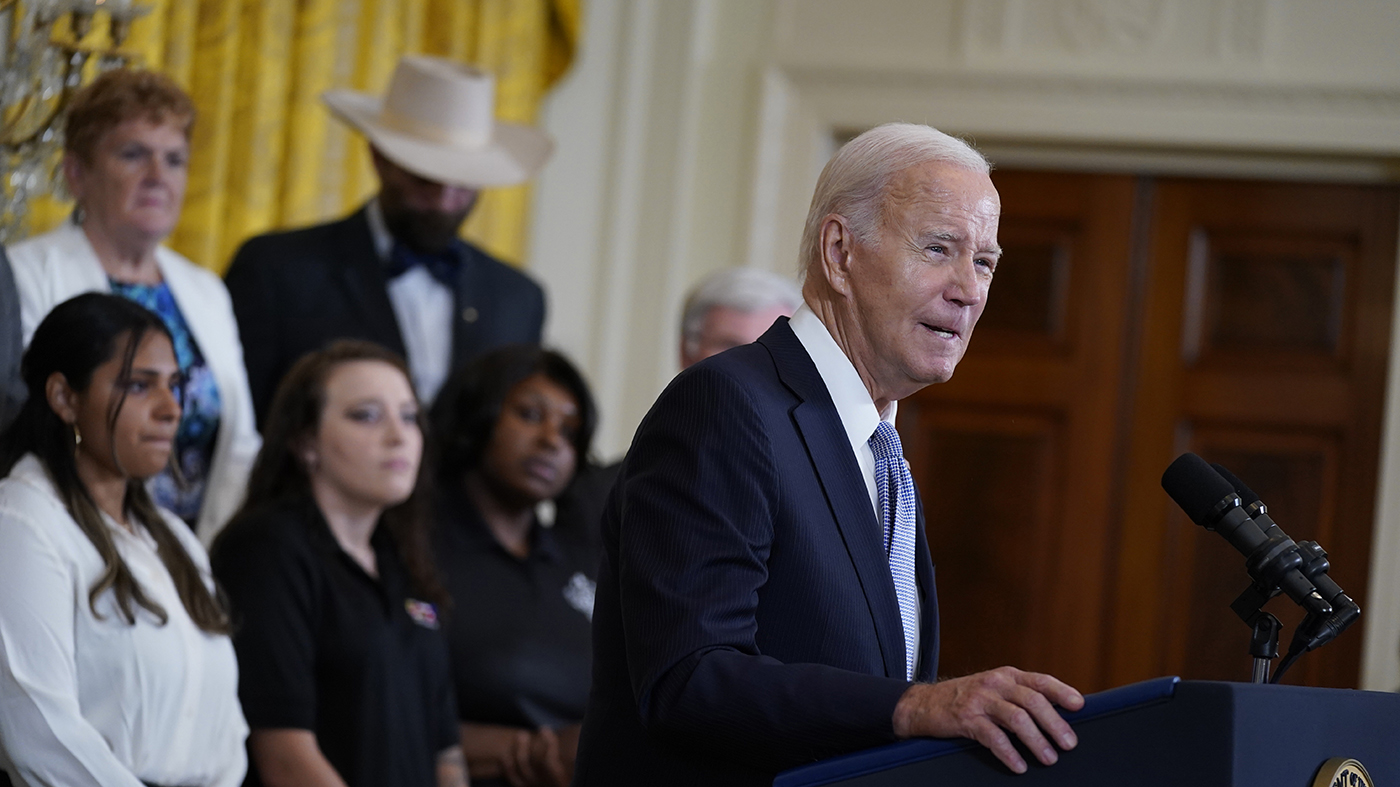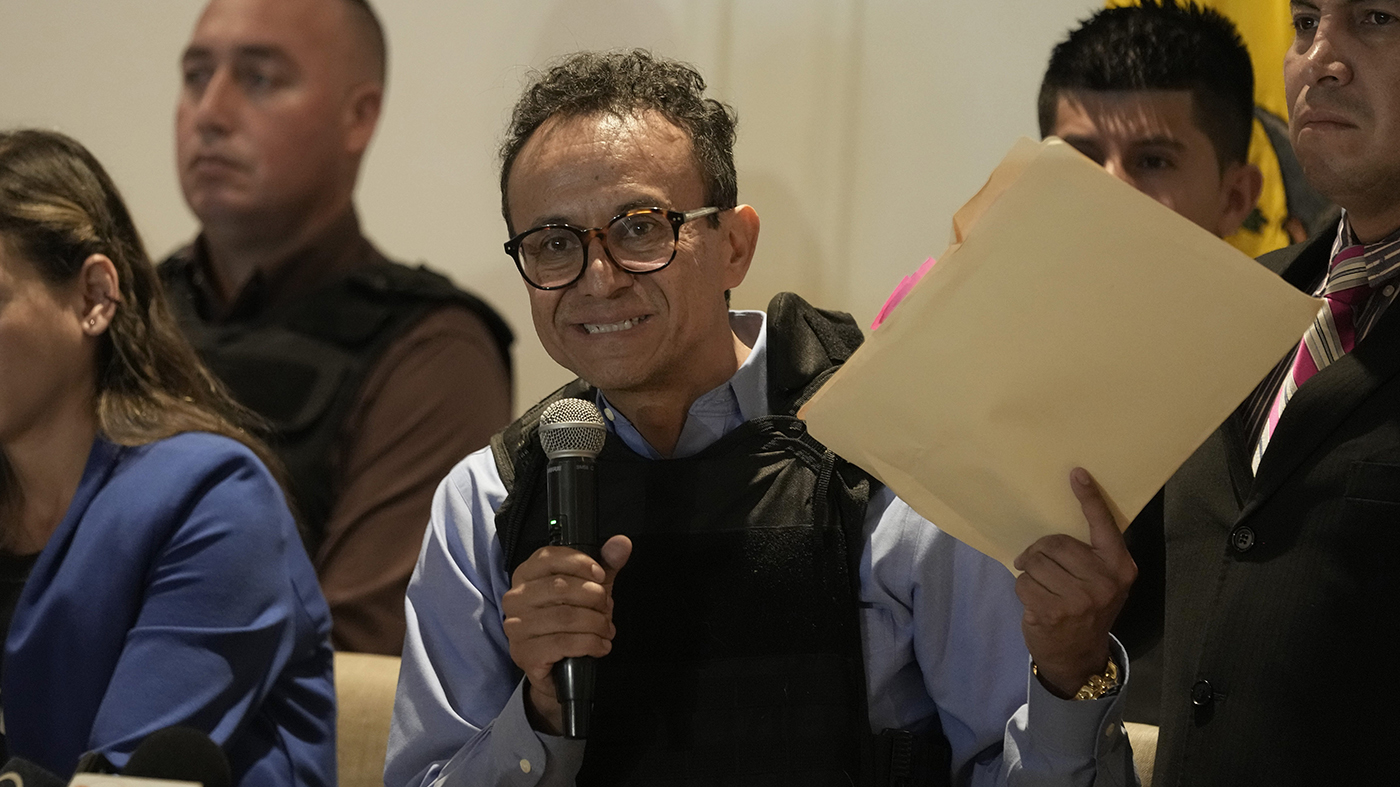The Hill’s Morning Report — Abortion pill clash ahead of 2024 elections
Editor’s note: The Hill’s Morning Report is our daily newsletter that dives deep into Washington’s agenda. To subscribe, click here or fill out the box below.
Abortion rights are reshaping the 2024 elections while mobilizing progressives and splintering Republicans between conservatives who favor a national ban and others who fear a backlash in next year’s elections and want to let states decide.
The Supreme Court, which last year overturned the constitutional right to abortion, is expected to settle an appeals court dispute over the most common abortion pill on the market. It would be the highest-stakes legal faceoff over abortion since the conservative majority overturned Roe v. Wade (The Hill).
On Wednesday, the stakes loomed on all sides when a three-judge federal appeals court panel imposed restrictions on the abortion pill mifepristone, although the ruling will not immediately impact the medication’s availability (CNBC).
The U.S. Court of Appeals for the 5th Circuit ruled that several decisions the Food and Drug Administration took to make mifepristone more broadly available to women did not take safety concerns into account. The case is almost certainly heading for a decision by the Supreme Court, where justices must first decide whether to take up the case. The high court earlier this year issued an emergency order preserving the status quo on mifepristone while the appeals process played out.
“The administration will continue to stand by FDA’s independent approval of mifepristone as safe and effective. In the face of these unprecedented attacks on women’s health, we will continue to fight for women’s freedom to make decisions about their own bodies,” White House press secretary Karine Jean-Pierre said in a statement.
Vice President Harris, in a written statement, said, “Americans across the country should be able look in their medicine cabinets and know that FDA-approved medication prescribed by a doctor will remain available. This decision stands between doctors and their patients.”
The FDA over time has made it easier to get access to the drug and to use it in up to 10 weeks of pregnancy rather than seven. Patients have been able to obtain the pills by mail from providers.
“In loosening mifepristone’s safety restrictions, [the Food and Drug Administration] failed to address several important concerns about whether the drug would be safe for the women who use it. It failed to consider the cumulative effect of removing several important safeguards at the same time,” Judge Jennifer Elrod wrote.
The judges on the 5th Circuit were appointed by Republican presidents. During oral arguments in May, the trio indicated a willingness to restrict access to the drug.
Abortion rights groups were quick on Wednesday to condemn the ruling, warning that abortion care in the U.S. is slipping out of reach and that the GOP seeks “a full nationwide abortion ban” that could “cost lives,” as Women’s March Executive Director Rachel O’Leary Carmona framed the situation in a statement.
Medication abortion currently accounts for more than half of all abortions in the U.S.
Fourteen states now have abortion bans and another 11 legislated various limitations, including six-week fetal “heartbeat” rules.
But GOP politicians are discovering that they are out of sync with majority public opinion on abortion and that Democratic candidates believe they have a winning playbook ahead.
Some conservative groups are pleading with candidates to abandon extreme positions, reports The Hill’s Nathaniel Weixel. The goal of a national abortion ban remains remote, they argue, and the aim is to win elections nationwide next year and then to continue working on restricting abortions in the states. The upshot is a “circular firing squad” among right-leaning groups and candidates, according to Patrick Brown, a fellow at the conservative Ethics and Public Policy Center.
Voters in Ohio this month overwhelmingly rejected a ballot measure pushed by Republican leaders that would have made it harder to enshrine abortion rights in the state constitution. The victory for Democrats and reproductive rights advocates was a sign that their messaging on abortion restrictions resonates with voters, even in some red states.
In Kansas last year, voters decided to keep abortion legal, rejecting a proposed state constitutional amendment (NPR).
Republican leaders in the nation’s capital have attempted to move beyond the abortion issue, but state conservatives want to keep abortion in the national spotlight. Senate Republicans believe conservative anti-abortion moves by state legislatures and governors could backfire and wind up boosting Democratic candidates in Arizona, Montana, Nevada and Pennsylvania, as well as Ohio.
The New York Times: Abortion pill rulings: What’s happened; what’s at stake; what’s next.
Related Articles
▪ The New York Times: Senate Majority Leader Chuck Schumer (D-N.Y.) said Wednesday that he and Speaker Kevin McCarthy (R-Calif.) agreed weeks ago that a stopgap spending bill of “several months” will be needed to avert a shutdown after Sept. 30.
▪ The Hill: Former New Jersey Gov. and GOP presidential candidate Chris Christie sees a path in New Hampshire to beat former President Trump.
▪ NBC News: Florida taxpayers last year paid $9.4 million for security and protection for Florida Republican Gov. Ron DeSantis and his family as he increased his travel while preparing for his presidential bid. The tab was $3 million more than his security costs in 2021.
▪ The Hill: Gender studies in higher education are on “high alert” amid conservative attacks.
▪ The New York Times: Samuel Miele, 27, a campaign aide to Rep. George Santos (R-N.Y.), was charged Wednesday with wire fraud and identity theft in a federal indictment after allegedly impersonating McCarthy’s former chief of staff. Miele pleaded not guilty.
LEADING THE DAY
➤ ADMINISTRATION
© Associated Press / Evan Vucci | President Biden on Wednesday marked a year since enactment of the $1 trillion Inflation Reduction Act.
President Biden celebrated the one-year anniversary of the signing of the Inflation Reduction Act (IRA) on Wednesday, saying at a White House event that the bill had done what it was intended to — reduce inflation.
“When the Inflation Reduction Act was passed a year ago today inflation was at 8.3 percent,” Biden said. “It’s now down to 3.2 percent, and it’s going to go lower.”
Yet most economists agree that the single biggest factor in lowering inflation over the past year was higher interest rates, which were repeatedly raised by the Federal Reserve. The IRA, on the other hand, funded investments in green energy and healthcare subsidies. Biden acknowledged the disconnect at a fundraiser last week, where he said he regretted the law’s name, as “it has less to do with reducing inflation than it does to do with dealing with providing for alternatives that generate economic growth.”
But the anniversary offered the White House an opportunity to tout the better-than-expected economy as Biden gears up for a tough reelection fight next fall. Over the course of his nearly 30-minute speech, Biden took several opportunities to remind the public that Republicans didn’t provide a single vote for the law’s passage in 2022 (The Hill and CNBC).
“It fell entirely to Democrats to deliver it,” he said.
One year after its adoption, the Inflation Reduction Act has resulted in significant strides in the adoption of renewable energy and other climate-friendly energy sources, The Hill’s Rachel Frazin reports. However, the industry is pushing for further changes to bolster renewables, while some analysts and environmental organizations say more “sticks” are needed to complement the “carrots” provided by the legislation in order to get the country to net-zero emissions.
Meanwhile, Sen. Joe Manchin (D-W.Va.) is in the midst of a difficult balancing act over the IRA as he keeps up a love-hate relationship with the law and weighs his political future in a ruby-red state. Only months after saying that he would vote to repeal the IRA — a measure he negotiated and his staff wrote — in protest of the Biden administration’s implementation of the law, Manchin has reembraced the legislation, issuing a pair of statements in support of it. However, writes The Hill’s Al Weaver, his delicate walk was on full display when he did not attend Wednesday’s event at the White House. Manchin said he will keep up his battle against the Biden administration and officials who seek to “undermine” the IRA as part of their “radical climate agenda,” while praising other parts of the legislation he helped write.
The Hill: Support is coming in for a bigger and stronger IRS that was souped up by Democrats a year ago with an initial funding boost of $80 billion from the Inflation Reduction Act.
Biden and first lady Jill Biden will travel to the Hawaiian island of Maui on Monday in the aftermath of raging wildfires that devastated much of the town of Lahaina and killed more than 100 people, the White House announced Wednesday. They will meet with emergency workers, survivors, and federal, state and local officials. The announcement followed criticism from Republicans that the president was not doing enough to address the disaster; Biden said in a speech in Milwaukee on Tuesday that he wanted to visit but did not want to get in the way of response operations (The New York Times).
▪ CNN: The White House orders federal agencies to shore up cybersecurity, warns of potential exposure.
▪ The Hill: The Biden administration’s tentative plan to unfreeze $6 billion in funds to Iran in exchange for the release of five American prisoners has become another contentious foreign policy deal as opinions diverge over how beneficial or harmful it would be for Washington.
▪ Reuters: Brazil’s President Luiz Inácio Lula da Silva and Biden discussed climate change and a job creation initiative in a Wednesday call.
➤ TRUMP WORLD
Fulton County, Ga., District Attorney Fani Willis (D) is requesting a March 4 start date in the trial of Trump and 18 co-defendants over an alleged plot to subvert the state’s 2020 election results and keep Trump in power. Willis also proposed that their arraignments occur during the week of Sept. 5, writing that the defendants would be notified of their arraignment date at least five days in advance, according to a new court filing. She said dates would not conflict with Trump’s other legal matters; however the March trial date is one day before Super Tuesday in the 2024 presidential race, in which Trump is the Republican frontrunner (The Hill and ABC News).
Legal experts told The Hill’s Ella Lee Willis’s timeline — which would involve trying all 19 defendants together — is ambitious at best, with the pure logistics of a trial of such magnitude creating roadblocks before it even begins.
“You worry it’s going to turn into a circus atmosphere,” said Kay Levine, a law professor at Emory University in Atlanta. A six-month timetable is “overly optimistic; very, very ambitious; and not really realistic,” Levine said. The simple act of adjusting to each defendant’s calendar will likely cause extensive delays — “a continuance for this and a continuance for that,” she said.
▪ Fox News (excerpts are HERE): Trump spoke with Fox Business host Larry Kudlow, a former adviser in his White House, for broadcast at 4 p.m. ET today.
▪ The Washington Post: Clues point to identities of “unindicted co-conspirators” in alleged Coffee County breach.
▪ NBC News: Trump supporters post names and addresses of Georgia grand jurors online.
▪ The New York Times: Trump’s allies are likely to be booked at a notorious Atlanta jail. The local sheriff has said the defendants would be treated like everyone else should they surrender at the jail; the process for Trump could be different.
▪ Politico: Georgia’s peculiar pardon system is bad news for Trump. Unlike with the federal prosecutions, Trump has no power to shut down the case if he’s reelected.
▪ The Hill’s Niall Stanage in The Memo: Ranking the risks for Trump in his four criminal indictments.
▪ NPR: Three reasons Trump’s latest charges could be hard for him to shake.
Mark Meadows has always prided himself on navigating the complexities of Washington’s power circles, The Hill’s Rebecca Beitsch, Alex Gangitano and Brett Samuels report. But the former White House chief of staff’s central role in Trump’s efforts to overturn the 2020 election could present the biggest challenge yet for a man who often claimed he plays “10-dimensional chess.” While Meadows appeared to avoid culpability in the federal case against Trump for his efforts to remain in power, that was not the case in Georgia, where he faces charges alongside others for racketeering as well as for solicitation of violation of oath by a public officer.
“This was inevitable, in my view, given his failure to rein in Trump. Given his failure as White House chief of staff,” said Chris Whipple, author of “The Gatekeepers,” a book chronicling the history of White House chiefs of staff. “I think he’s always been a guy who played every side of the fence. He was a yes man, but not just to Trump. He was a yes man to everyone. But that may have been too clever by half, and it’s all caught up with him.”
▪ The Associated Press: Americans are divided along party lines over Trump’s actions in election cases, AP-NORC poll shows.
▪ NBC News: A Texas woman was arrested and charged with threatening the federal judge overseeing Trump’s election case.
IN FOCUS/SHARP TAKES
➤ INTERNATIONAL
Russian drones attacked grain storage facilities and ports along the Danube River, which Ukraine has relied on as an alternative transport route to Europe since Moscow broke off a key shipping agreement using the Black Sea. Meanwhile, a loaded container ship stranded at the Black Sea port of Odesa since the beginning of Russia’s invasion set sail along a temporary corridor established by Ukraine for merchant shipping — testing the extent of Russia’s threats.
Ukraine’s economy, crunched by the war, is heavily dependent on farming. Its agricultural exports are crucial for world supplies of wheat, barley, sunflower oil and other foods that developing nations rely on. Since Russia withdrew from the grain agreement, Kyiv has sought to reroute transport through the Danube and road and rail links into Europe. But transport costs that way are higher, some European countries have balked at the consequences for grain prices, and the ports can’t handle the same volume as seaports (The Washington Post and The Associated Press).
▪ Reuters: Ukraine claims gains on southeastern front as fighting rages in east.
▪ The New York Times: A 40-mile channel in Romania, best known outside shipping circles as a magnet for bird watchers, is now a crucial route allowing Ukrainian grain to reach the sea, protected by a NATO umbrella.
▪ Reuters: A Russian raid off Turkey’s coast tests President Recep Tayyip Erdoğan’s reserve.
Insurgents killed 17 soldiers and wounded nearly 24 in the first major attack in six months against Niger’s army. Western powers fear a coup by the elite presidential guard last month that deposed democratically elected President Mohamed Bazoum is weakening a rare ally against jihadi violence in West Africa’s Sahel region. Niger has slowed, but not stopped, a wave of extremists pushing south to coastal states.
That could be in jeopardy if a regional conflict breaks out or the junta orders the Western forces — including 1,100 American troops — to leave and three U.S. drone bases to be shuttered (The Associated Press and The New York Times).
Defense chiefs from the West African regional bloc, ECOWAS, are meeting in Ghana today to discuss Niger’s crisis after a deadline passed for the soldiers to release and reinstate Bazoum or face military intervention. ECOWAS has a poor track record in stemming the region’s rampant coups: neighboring Burkina Faso and Mali have each had two within three years (The Associated Press).
▪ The Associated Press: What airlines want to fly over Taliban-held Afghanistan? New rules allow it, but planes largely avoid it.
▪ Bloomberg News: Argentina’s leading presidential candidate, conservative Javier Milei, pledged to close the nation’s central bank while saying he would make every effort to avoid a default on the country’s sovereign debt.
▪ The Wall Street Journal: U.S. moves to cut research ties with China over security concerns threatening American progress in critical areas, some scientists warn.
Ecuador’s newest presidential candidate, Christian Zurita, who replaced the assassinated Fernando Villavicencio in the presidential race, said he fears for his life, adding he wears a bulletproof vest and has sent his family into hiding. Just days before the elections, the kind of precautions Zurita is taking were previously unheard of in his country (The Wall Street Journal).
© Associated Press / Martin Mejia | Wearing a bulletproof vest, Christian Zurita, who replaced assassinated presidential candidate Fernando Villavencencio, held a press conference in Guayaquil, Ecuador, on Wednesday.
OPINION
■ Every American citizen has a stake in seeing Trump’s trial on TV, by John M. Crisp, columnist, The San Jose Mercury-News.
■ It’s not your father’s Democratic Party. But whose party is it? by Thomas B. Edsall, columnist, The New York Times.
WHERE AND WHEN
The House will convene for a pro forma session at 10:30 a.m. on Friday. Lawmakers return to Washington Sept. 11.
The Senate is out until Sept. 5 and will hold a pro forma session on Friday at 1 p.m.
The president will receive the President’s Daily Brief at 10 a.m. Biden will travel to Scranton, Pa., to pay respects at 12:55 p.m. to the late Ellen Casey, mother of Sen. Bob Casey (D-Pa.) and former Pennsylvania first lady, at St. Peter’s Cathedral. He will travel to Camp David in Maryland, arriving at 3:15 p.m., to be there ahead of Friday’s trilateral meeting with the leaders of Japan and South Korea.
The vice president is in Los Angeles and has no public events.
Secretary of State Antony Blinken meets at 9:15 a.m. with Israeli Minister for Strategic Affairs Ron Dermer at the State Department.
Economic indicator: The Labor Department will report at 8:30 a.m. on claims for unemployment benefits filed in the week ending Aug. 12.
© Associated Press / Pablo Martinez Monsivais | Camp David in 2008.
ELSEWHERE
➤ HEALTH & WELLBEING
While most cancers in the United States are found in people aged 65 and older, a new study shows a concerning trend: Cancer is on the rise among younger Americans, particularly women, with gastrointestinal, endocrine and breast cancers climbing at the fastest rates. While cancers among older adults have declined, cancers among people younger than 50 have increased slightly overall, with the largest increases among those age 30 to 39, according to a study published Wednesday in JAMA Network Open (The Washington Post and The Hill).
“This is a population that has had less focus in cancer research and their numbers are getting bigger, so it’s important to do more research to understand why this is happening,” Paul Oberstein, director of the gastrointestinal medical oncology program at NYU Langone’s Perlmutter Cancer Center, who was not involved in the study, told the Post.
▪ The New York Times: Addiction treatment eludes more than half of Americans in need.
▪ The Associated Press: States that protect transgender health care now try to absorb demand from areas with restrictions.
THE CLOSER
© Associated Press / The Crowley Company, Library of Congress via AP | On Aug. 19, 1920, following the ratification of the 19th Amendment to the Constitution affirming women’s right to vote, National Woman’s Party chair Alice Paul celebrated with a banner at the party’s Washington headquarters.
Take Our Morning Report Quiz
And finally … It’s Thursday, which means it’s time for this week’s Morning Report Quiz! Inspired by the 103rd anniversary on Friday of the ratification of the 19th Amendment to the Constitution, we’re eager for some smart guesses about women’s right to vote in America.
Be sure to email your responses to asimendinger@digital-stage.thehill.com and kkarisch@digital-stage.thehill.com — please add “Quiz” to your subject line. Winners who submit correct answers will enjoy some richly deserved newsletter fame on Friday.
Which U.S. president, who was worried about upcoming elections, pleaded with senators during a floor speech that giving female citizens the right to vote would deliver “justice to women”?
- William McKinley
- Theodore Roosevelt
- William Howard Taft
- Woodrow Wilson
How did many men explain their opposition to voting rights for women?
- Suffrage was up to the states
- Women were emotionally and intellectually incapable of reasoned decisions
- Relenting to years of lobbying by the “petticoat brigade” would be emasculating
- All of the above
From which country did the U.S. suffrage movement borrow the visually impactful idea of dressing in white?
- Britain
- India
- France
- Russia
Which state was the 36th and scale-tipping vote to approve women’s suffrage, making ratification of the 19th Amendment to the Constitution possible?
- Alabama
- Tennessee
- Illinois
- Pennsylvania
Bonus point: Name the House member who cast a deciding vote on suffrage in 1919, changing his mind after his mother wrote him a letter saying, “don’t forget to be a good boy” and vote for ratification.
Stay Engaged
We want to hear from you! Email: Alexis Simendinger (asimendinger@digital-stage.thehill.com) and Kristina Karisch (kkarisch@digital-stage.thehill.com) . Follow us on Twitter (@asimendinger and @kristinakarisch) and suggest this newsletter to friends!
Copyright 2023 Nexstar Media Inc. All rights reserved. This material may not be published, broadcast, rewritten, or redistributed. Regular the hill posts












